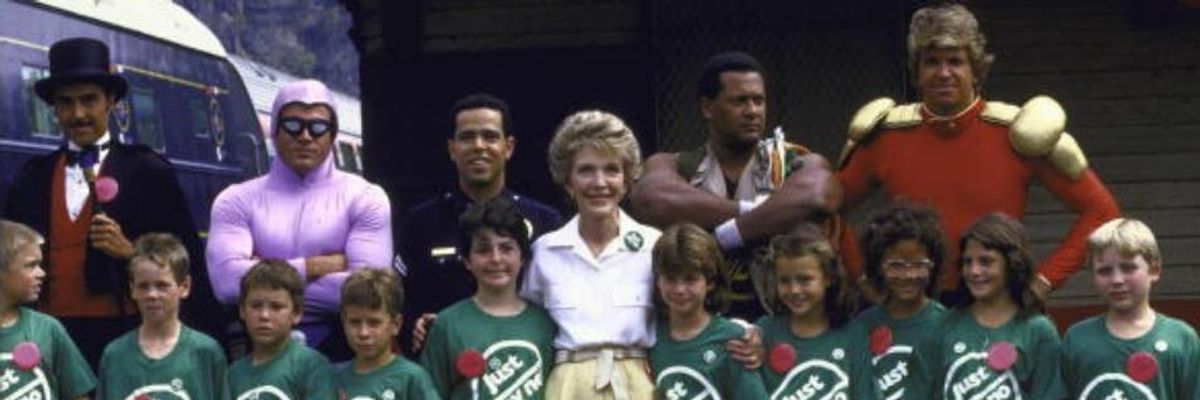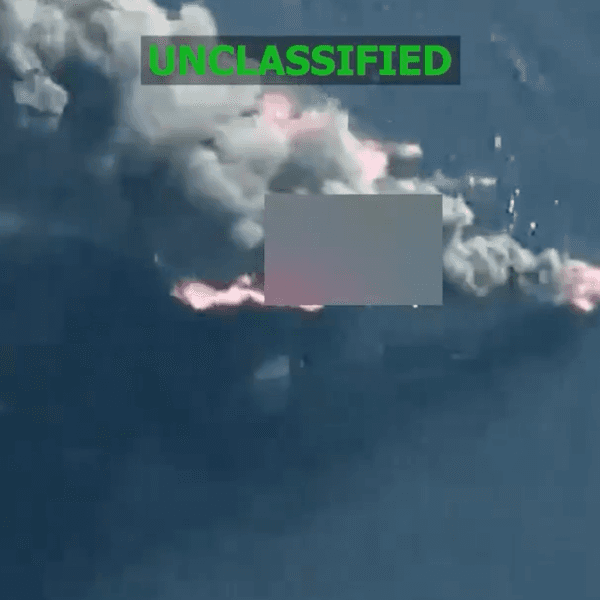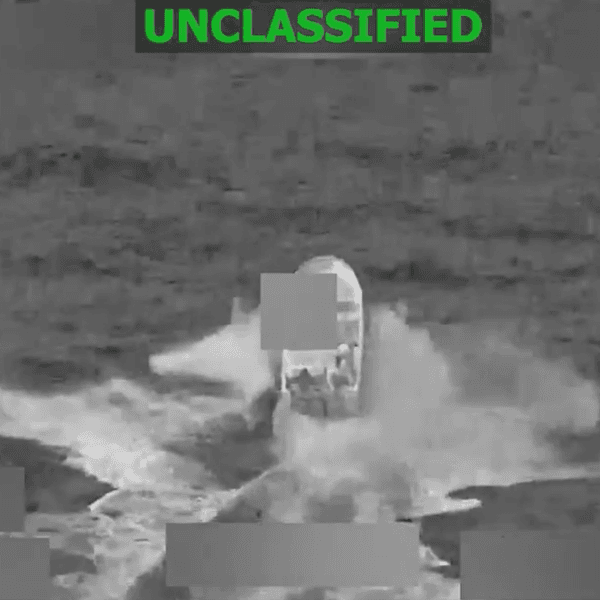
President Donald Trump's speech on the opioid epidemic brought to mind First Lady Nancy Reagan's "Just Say No" anti-drug campaign of the 1980s, which many drug policy experts have denounced as simplistic and ineffective. (Photo: Cynthia Johnson/Getty Images)
In 'Full-on War on Drugs Scare-Fest,' Trump Proposes Death Penalty and 'Very, Very Bad' Commercials
In his speech on the opioid epidemic, the president promoted his plan to build a wall on the U.S.-Mexico border and suggested that an advertising campaign would keep Americans from using drugs
In a speech officially unveiling his administration's plan to combat the nation's ongoing opioid epidemic, President Donald Trump on Monday saod he would fight the crisis with "toughness", the creation of "very...very...bad commercials" aimed at children; and--as expected--proposed that the death penalty be applied to drug dealers.
However, as drug policy reform advocates feared, he showed little understanding of the origins of the crisis and neglected to mention numerous measures public health experts have advocated for to stop the deadly epidemic.
A key tenet of Trump's plan to combat the crisis, which killed nearly 64,000 Americans in 2016, is to launch an advertising campaign showing the effects of opioid use.
"The best way to beat the drug crisis is to keep people from getting hooked on drugs to begin with," he told a crowd in Manchester, N.H. "As part of that effort--so important, this is something I've been strongly in favor of--spending a lot of money on great commercials showing how bad it is."
The ads, Trump added, would be "very...very...bad commercials...And when they see those commercials, hopefully they're not going to be going to drugs of any kind."
The proposal struck critics as similar to First Lady Nancy Reagan's "Just Say No" campaign of the 1980s, which has been denounced as "simplistic and vague" and which studies have shown did not make young Americans any less likely to use drugs.
While Trump spent a large portion of his speech talking about keeping kids away from drugs, statistics show that Americans in their 50s and 60s are most at risk for overdosing on prescription opioids--a major driver of the overall crisis.
The prevalence of heroin abuse is of greater concern among younger Americans, but recent studies have shown that three-quarters of people who began using heroin in the 2000s abused prescription opioid painkillers first. Doctors have suggested that lax prescribing practices within their own profession continue to contribute to the opioid crisis--calling into question the notion that commercials would successfully steer Americans away from the drugs.
The president also linked the epidemic to immigration, urging Democrats to back his plan to "build the wall to keep the damn drugs out" and leading audience members in the chant, "Build the wall!"
But drug policy experts say that tougher border security would have little to no effect on the prevalence of drugs in the U.S.
"A wall alone cannot stop the flow of drugs into the United States," Christopher Wilson of the Mexico Institute at the Wilson Center, told Vox last year. "...history shows us that border enforcement has been much more effective at changing the when and where of drugs being brought into the United States rather than the overall amount of drugs being brought into the United States."
Critics also expressed shock at the president's proposal to seek the death penalty for drug dealers--a plan that was hinted at last week. Trump has expressed admiration for Filipino President Rodrigo Duterte's drug war--which has resulted in the deaths of thousands, many in poor communities--and the stringent drug policies applied by Singapore's government.
"We can have all the blue ribbon committees we want but if we don't get tough on the drug dealers we're wasting our time...and that toughness includes the death penalty," said the president.
The remark was condemned on social media by many, including drug policy experts, who have long said drug addition should be treated as a public health issue instead of a criminal matter.
An Urgent Message From Our Co-Founder
Dear Common Dreams reader, The U.S. is on a fast track to authoritarianism like nothing I've ever seen. Meanwhile, corporate news outlets are utterly capitulating to Trump, twisting their coverage to avoid drawing his ire while lining up to stuff cash in his pockets. That's why I believe that Common Dreams is doing the best and most consequential reporting that we've ever done. Our small but mighty team is a progressive reporting powerhouse, covering the news every day that the corporate media never will. Our mission has always been simple: To inform. To inspire. And to ignite change for the common good. Now here's the key piece that I want all our readers to understand: None of this would be possible without your financial support. That's not just some fundraising cliche. It's the absolute and literal truth. We don't accept corporate advertising and never will. We don't have a paywall because we don't think people should be blocked from critical news based on their ability to pay. Everything we do is funded by the donations of readers like you. Will you donate now to help power the nonprofit, independent reporting of Common Dreams? Thank you for being a vital member of our community. Together, we can keep independent journalism alive when it’s needed most. - Craig Brown, Co-founder |
In a speech officially unveiling his administration's plan to combat the nation's ongoing opioid epidemic, President Donald Trump on Monday saod he would fight the crisis with "toughness", the creation of "very...very...bad commercials" aimed at children; and--as expected--proposed that the death penalty be applied to drug dealers.
However, as drug policy reform advocates feared, he showed little understanding of the origins of the crisis and neglected to mention numerous measures public health experts have advocated for to stop the deadly epidemic.
A key tenet of Trump's plan to combat the crisis, which killed nearly 64,000 Americans in 2016, is to launch an advertising campaign showing the effects of opioid use.
"The best way to beat the drug crisis is to keep people from getting hooked on drugs to begin with," he told a crowd in Manchester, N.H. "As part of that effort--so important, this is something I've been strongly in favor of--spending a lot of money on great commercials showing how bad it is."
The ads, Trump added, would be "very...very...bad commercials...And when they see those commercials, hopefully they're not going to be going to drugs of any kind."
The proposal struck critics as similar to First Lady Nancy Reagan's "Just Say No" campaign of the 1980s, which has been denounced as "simplistic and vague" and which studies have shown did not make young Americans any less likely to use drugs.
While Trump spent a large portion of his speech talking about keeping kids away from drugs, statistics show that Americans in their 50s and 60s are most at risk for overdosing on prescription opioids--a major driver of the overall crisis.
The prevalence of heroin abuse is of greater concern among younger Americans, but recent studies have shown that three-quarters of people who began using heroin in the 2000s abused prescription opioid painkillers first. Doctors have suggested that lax prescribing practices within their own profession continue to contribute to the opioid crisis--calling into question the notion that commercials would successfully steer Americans away from the drugs.
The president also linked the epidemic to immigration, urging Democrats to back his plan to "build the wall to keep the damn drugs out" and leading audience members in the chant, "Build the wall!"
But drug policy experts say that tougher border security would have little to no effect on the prevalence of drugs in the U.S.
"A wall alone cannot stop the flow of drugs into the United States," Christopher Wilson of the Mexico Institute at the Wilson Center, told Vox last year. "...history shows us that border enforcement has been much more effective at changing the when and where of drugs being brought into the United States rather than the overall amount of drugs being brought into the United States."
Critics also expressed shock at the president's proposal to seek the death penalty for drug dealers--a plan that was hinted at last week. Trump has expressed admiration for Filipino President Rodrigo Duterte's drug war--which has resulted in the deaths of thousands, many in poor communities--and the stringent drug policies applied by Singapore's government.
"We can have all the blue ribbon committees we want but if we don't get tough on the drug dealers we're wasting our time...and that toughness includes the death penalty," said the president.
The remark was condemned on social media by many, including drug policy experts, who have long said drug addition should be treated as a public health issue instead of a criminal matter.
In a speech officially unveiling his administration's plan to combat the nation's ongoing opioid epidemic, President Donald Trump on Monday saod he would fight the crisis with "toughness", the creation of "very...very...bad commercials" aimed at children; and--as expected--proposed that the death penalty be applied to drug dealers.
However, as drug policy reform advocates feared, he showed little understanding of the origins of the crisis and neglected to mention numerous measures public health experts have advocated for to stop the deadly epidemic.
A key tenet of Trump's plan to combat the crisis, which killed nearly 64,000 Americans in 2016, is to launch an advertising campaign showing the effects of opioid use.
"The best way to beat the drug crisis is to keep people from getting hooked on drugs to begin with," he told a crowd in Manchester, N.H. "As part of that effort--so important, this is something I've been strongly in favor of--spending a lot of money on great commercials showing how bad it is."
The ads, Trump added, would be "very...very...bad commercials...And when they see those commercials, hopefully they're not going to be going to drugs of any kind."
The proposal struck critics as similar to First Lady Nancy Reagan's "Just Say No" campaign of the 1980s, which has been denounced as "simplistic and vague" and which studies have shown did not make young Americans any less likely to use drugs.
While Trump spent a large portion of his speech talking about keeping kids away from drugs, statistics show that Americans in their 50s and 60s are most at risk for overdosing on prescription opioids--a major driver of the overall crisis.
The prevalence of heroin abuse is of greater concern among younger Americans, but recent studies have shown that three-quarters of people who began using heroin in the 2000s abused prescription opioid painkillers first. Doctors have suggested that lax prescribing practices within their own profession continue to contribute to the opioid crisis--calling into question the notion that commercials would successfully steer Americans away from the drugs.
The president also linked the epidemic to immigration, urging Democrats to back his plan to "build the wall to keep the damn drugs out" and leading audience members in the chant, "Build the wall!"
But drug policy experts say that tougher border security would have little to no effect on the prevalence of drugs in the U.S.
"A wall alone cannot stop the flow of drugs into the United States," Christopher Wilson of the Mexico Institute at the Wilson Center, told Vox last year. "...history shows us that border enforcement has been much more effective at changing the when and where of drugs being brought into the United States rather than the overall amount of drugs being brought into the United States."
Critics also expressed shock at the president's proposal to seek the death penalty for drug dealers--a plan that was hinted at last week. Trump has expressed admiration for Filipino President Rodrigo Duterte's drug war--which has resulted in the deaths of thousands, many in poor communities--and the stringent drug policies applied by Singapore's government.
"We can have all the blue ribbon committees we want but if we don't get tough on the drug dealers we're wasting our time...and that toughness includes the death penalty," said the president.
The remark was condemned on social media by many, including drug policy experts, who have long said drug addition should be treated as a public health issue instead of a criminal matter.

